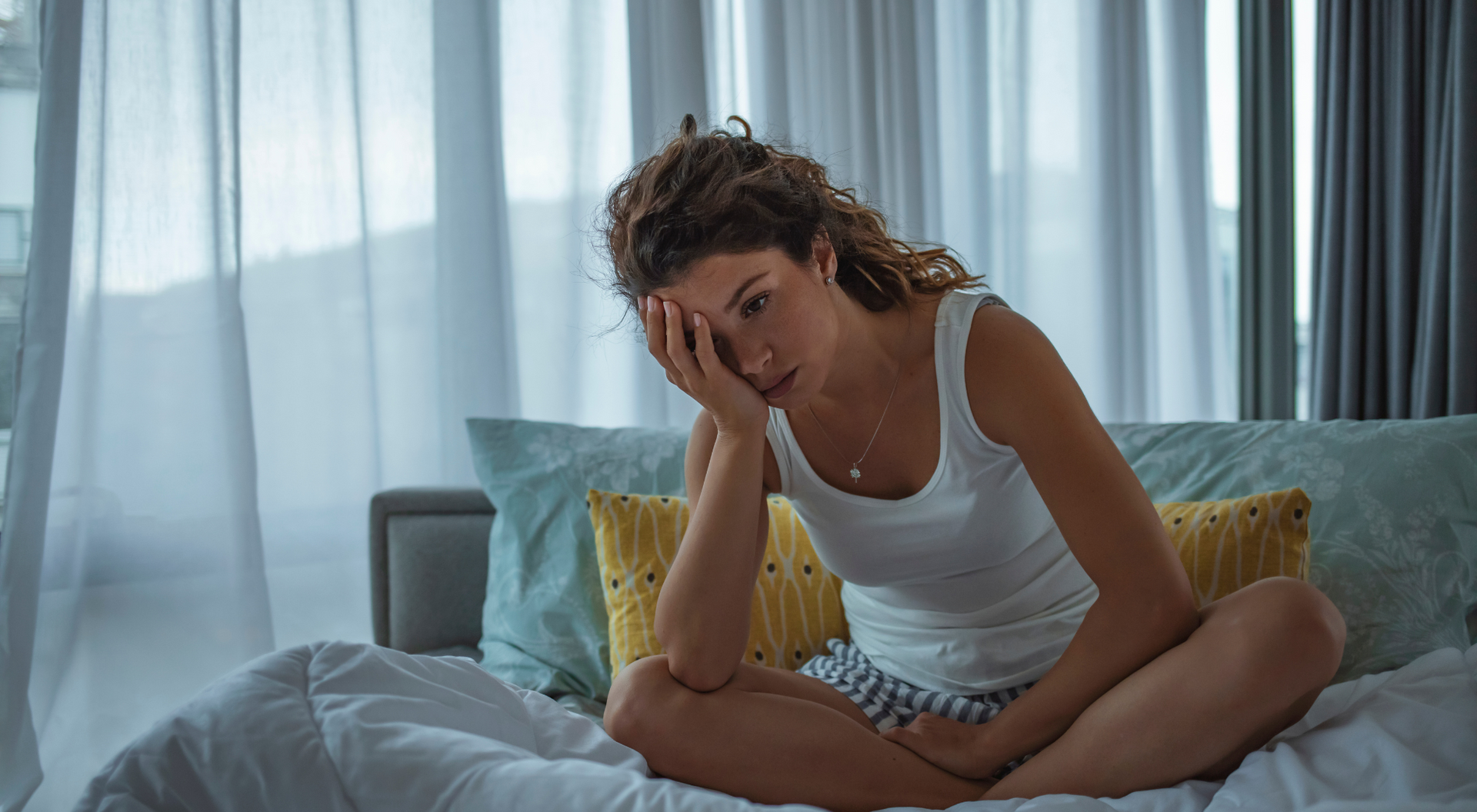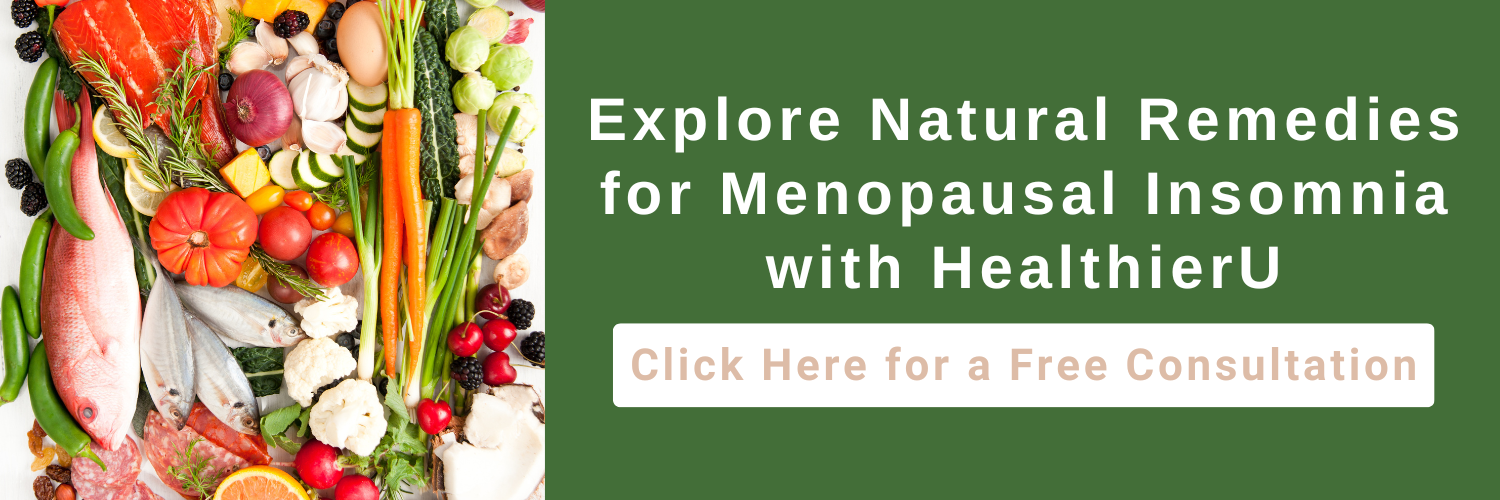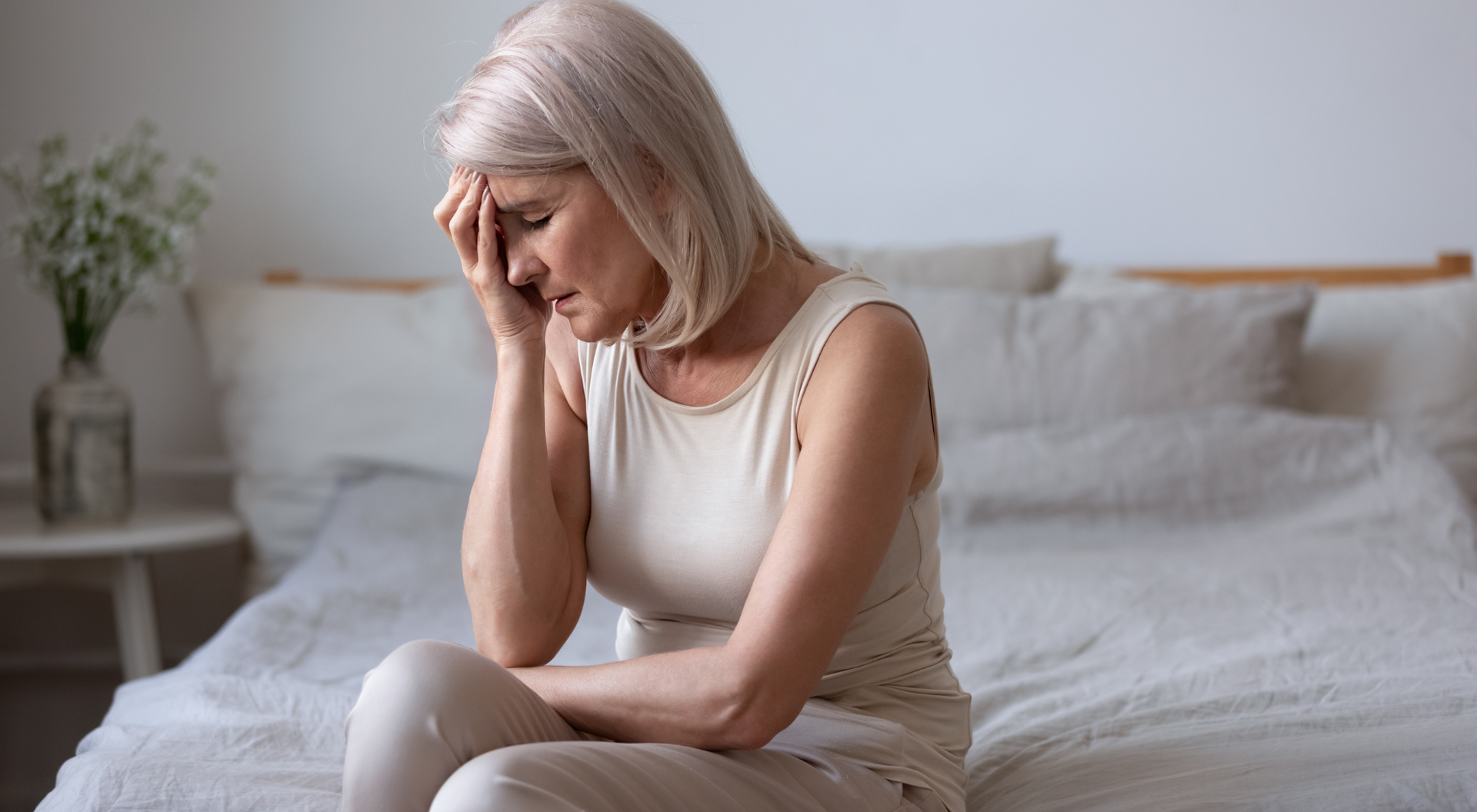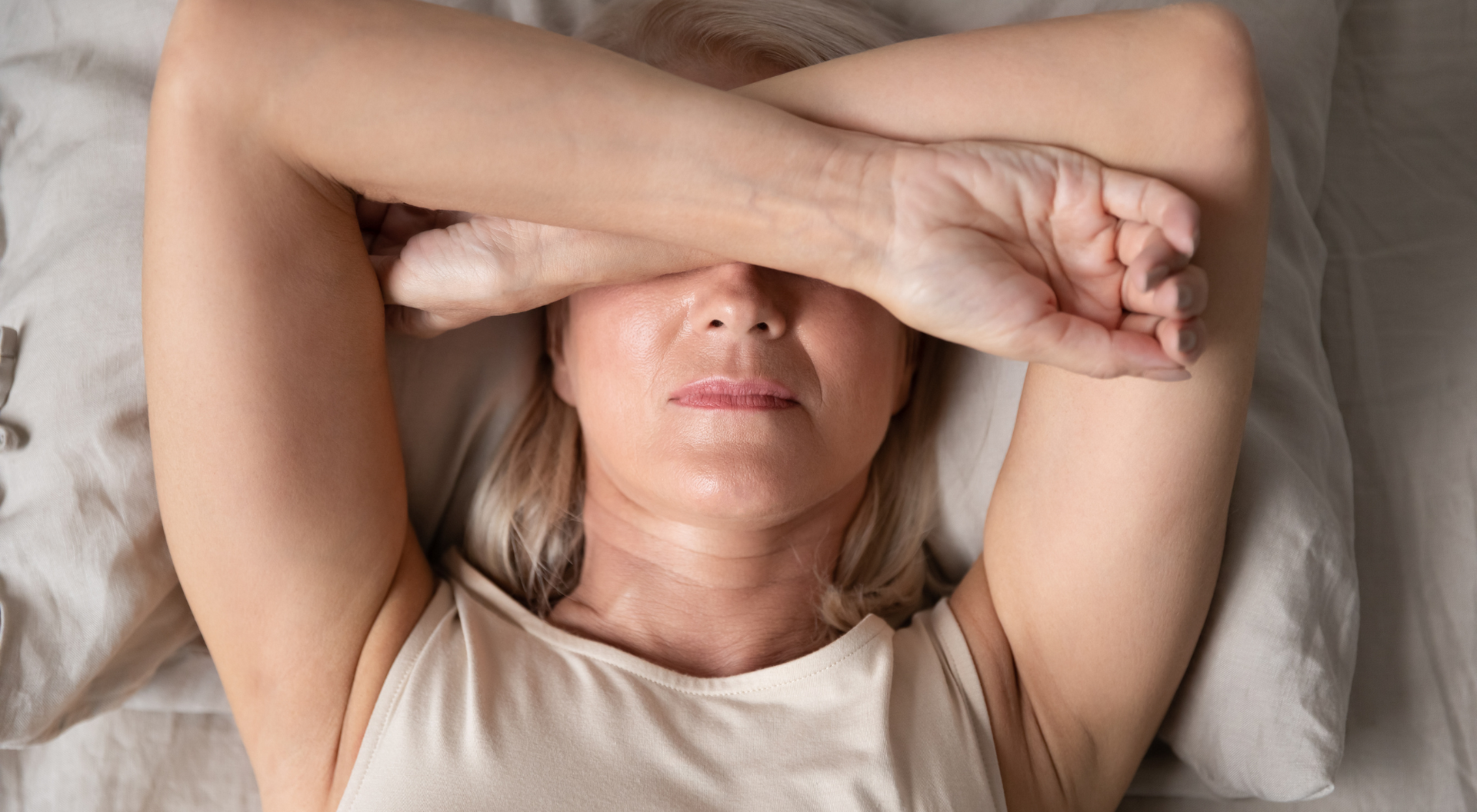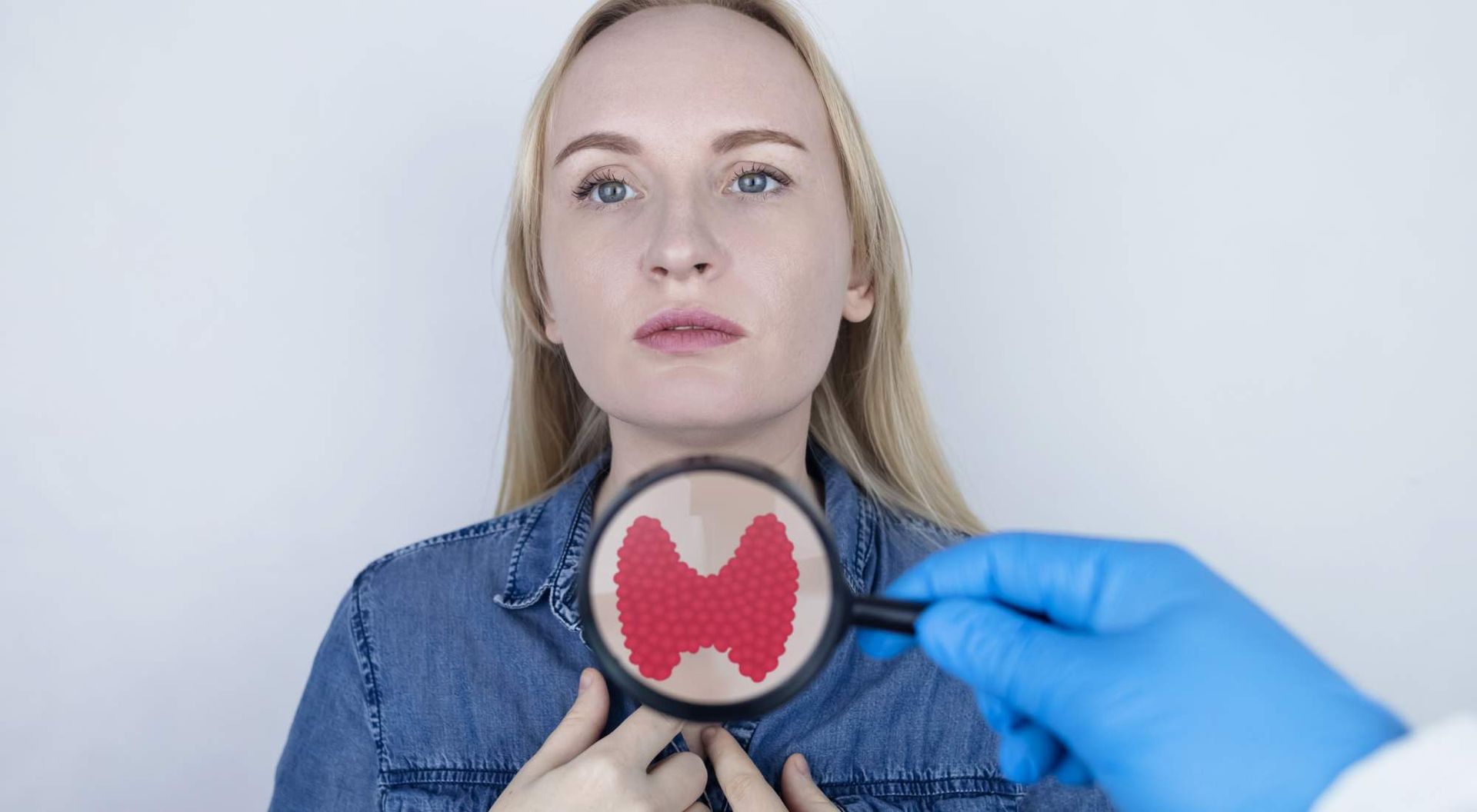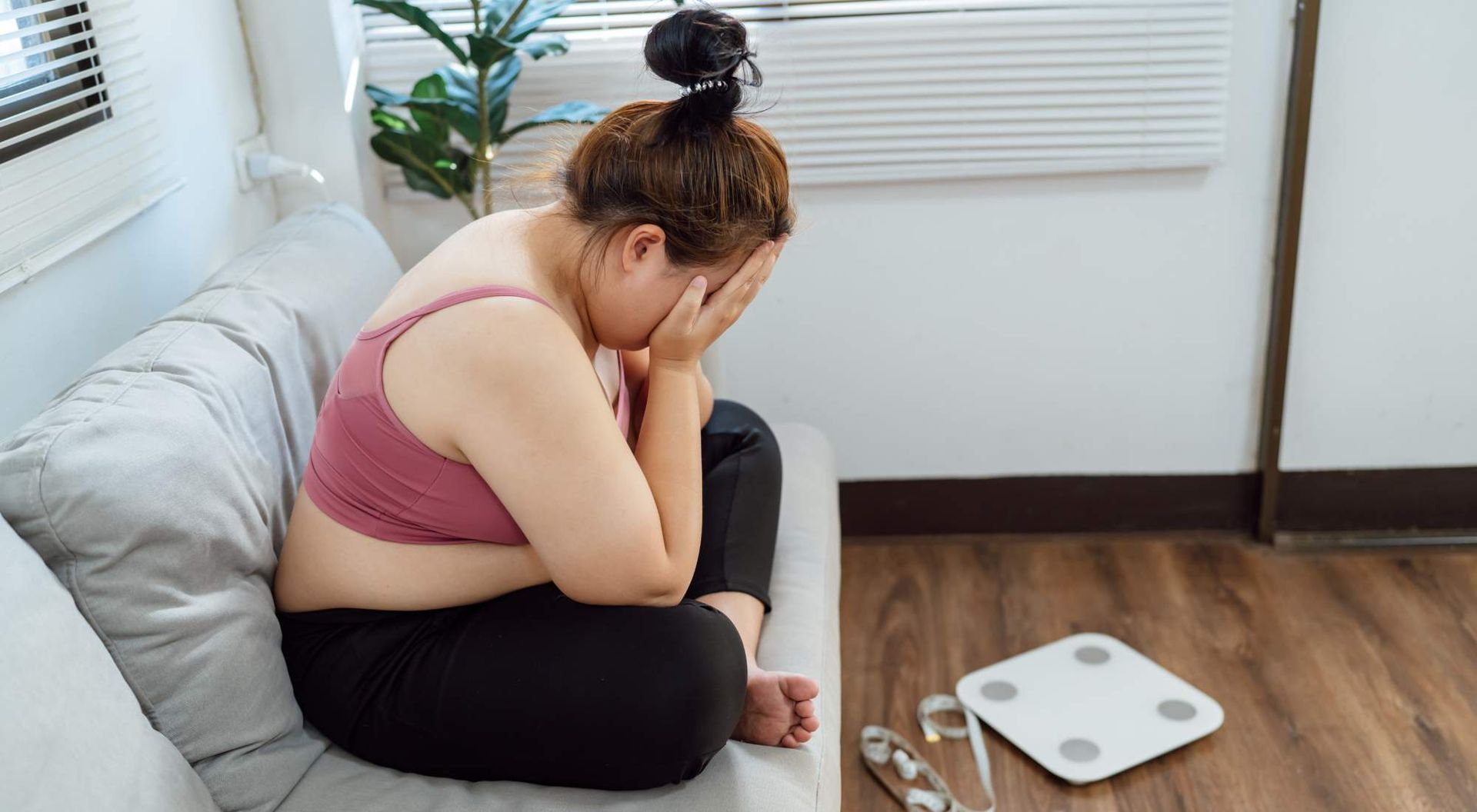Exploring Natural Remedies for Menopause Sleeplessness
"The content below is not intended to be a substitute for professional medical advice, diagnosis, or treatment. Always seek the advice of your physician or other qualified health provider with any questions you may have regarding a medical condition."
If the hot flashes, vaginal dryness, and weight gain aren’t enough — the effects of menopause are now keeping you wide awake at night.
While you’re hoping to steer clear of medication, you also don’t want to feel exhausted day in and day out. You still have a lot of life to live, and you want to live it fully awake.
Are there natural remedies for menopause sleeplessness?
If you’re experiencing sleeplessness as a side effect of menopause, we can help. Read on to discover proven natural remedies and holistic approaches that may help treat menopause insomnia.
Table of Contents
Why Can’t I Sleep at Night? Understanding Insomnia and Menopause
Insomnia is a sleep disorder that’s characterized by continued difficulty falling or staying asleep.
And it’s a common problem among women in the menopausal season of life.
According to a
study by the National Institutes of Health, sleep disturbance varies from 39% to 47% for women in perimenopause, and from 35% to 60% for post-menopausal women.
What Causes Sleeplessness During Menopause?
There are a variety of factors that can contribute to the problem of sleeplessness in menopausal women, including:
- Hot flashes — While they can happen during the day or night, if you’ve ever experienced a menopausal hot flash, you will understand why it's impossible to sleep through them.
- Cortisol — Levels of this natural stress hormone spike just after a hot flash. This can bring on feelings of over-alertness or anxiety that make sleeping difficult.
- Stressors of daily life — By the time a woman hits menopause, she is often knee-deep in the stress of her career and family life.
- Diet — A study of the relationship between a menopausal woman's sleep and carbohydrate intake revealed that diet plays a role in insomnia. The research showed that postmenopausal women whose diets were high in refined carbohydrates — especially added sugars — were more likely to develop insomnia. On the other hand, women who consumed a diet that included higher vegetables, whole fruit, and fiber were less likely to struggle with sleeplessness.
- Hormones — The hormone estradiol can contribute to poor sleep in menopause sleeplessness. Studies have revealed a relationship between low levels of estradiol and insomnia. This is particularly true when the hormone decline happens rapidly, as it does after a woman undergoes surgery to remove the ovaries.
If you’re looking for natural remedies for menopause sleeplessness, HealthierU can help.
Our holistic approach to your health through Nutrition Response Testing allows many women to experience relief from their symptoms — all without the use of medication.
What Helps Menopause Insomnia Naturally?
You have a number of great, effective options when it comes to natural remedies for menopausal sleeplessness.
Here are just a few:
- Get plenty of sunlight
- Follow a regular sleep schedule
- Move your body
- Eat a healthy diet
- Avoid caffeine and alcohol
- Take natural supplements
- Get Nutrition Response Testing
9 Natural Remedies for Menopause Sleeplessness
#1: Get Enough Sunlight
Looking for natural relief from insomnia? Try going outside!
Exposure to natural daylight helps to keep your circadian rhythm balanced and prepares your mind and body for a restful night by supporting the secretion of the sleep hormone, melatonin.
#2: Practice Good Sleep Hygiene
We know life is busy, but try to do your best to follow a regular sleep schedule.
Wake up and go to bed at the same time each day. Avoid napping in the late afternoon if you can.
Being on screens late at night can also affect your sleep by suppressing melatonin — the hormone your body needs to fall asleep. If you absolutely must be in front of a screen in the evening hours,
evidence shows that blue light-blocking glasses may help.
#3: Establish a Relaxing Sleep Routine
Another great natural remedy for menopause sleeplessness is to follow a consistent sleep routine.
The Centers for Disease Control and Prevention offers the following tips for getting a better night’s sleep :
- Establish a bedtime ritual beginning 30–90 minutes before bedtime. This may include a hot bath, lighting a candle, meditation, reading a book, or writing in a journal.
- Get into bed at the same time each night and wake up at the same time each morning, even on the weekends.
- Make sure your bedroom is relaxing, dark, quiet, and cool.
- Don’t keep electronic devices, such as TVs, smartphones, and computers in your bedroom.
- Don’t eat large meals or drink caffeine or alcohol before bedtime.
- Get regular exercise, since being physically active during the day can make it easier for you to fall asleep at night.
#4: Exercise
Good sleep at night begins with your daytime habits.
Research has shown that a simple, consistent exercise routine may help you fight insomnia and sleep more soundly at night.
And when it comes to exercise, a little goes a long way and includes things like taking a brisk walk over your lunch break or using the stairs instead of the elevator.
#5: Eating Habits
Your eating habits can also make a difference in menopausal insomnia.
Skip things such as:
- Fried foods
- Spicy foods
- Sugar
- Caffeine; and
- Alcohol
Opt instead for a balanced, healthy diet full of foods like:
- Fresh fruits and vegetables
- Lean protein
- Whole grains; and
- Fatty fish
Try to eat your last meal at least three to four hours before bedtime. And if you need a snack, reach for a handful of nuts or celery and hummus.
#6: Monitor Caffeine and Alcohol Intake
Drinking habits also come into play when you’re preparing for a good night’s sleep, and that means steering clear of anything containing caffeine or alcohol.
Caffeine can impact your sleep for up to six hours after consuming it, and alcohol for up to five hours.
That means that if you have a cup of coffee, energy drink, or beer in the late afternoon, the stimulating effects will still be in your system around bedtime.
#7: Experiment With Natural Supplements
Magnesium
Magnesium is a great natural remedy for menopause sleeplessness due to its ability to help you feel sleepy by activating your parasympathetic nervous system — which helps you feel calm and relaxed.
Author of The Sleep Solution, W. Christopher Winter, MD, and board-certified sleep specialist at Charlottesville Neurology and Sleep Medicine in Virginia, says magnesium:
- Helps calm the nervous system, allowing it to work more efficiently.
- Causes your muscles to relax
- Enhances nerve function
- Relieves the symptoms of restless leg syndrome
- Helps your body maintain the needed levels of gamma-aminobutyric acid (GABA), the neurotransmitter responsible for helping you fall asleep
If your body’s level of magnesium is abnormally low, it may lead to insomnia.
Melatonin
You likely know melatonin is a go-to supplement for sleep.
This easy-to-find supplement improves your sleep by helping your body regulate its internal clock and sleep-wake cycles.
Melatonin can also lessen the time it takes to fall asleep and help you stay asleep longer. Higher levels of melatonin also may improve the quality of sleep and reduce daytime sleepiness and fatigue, as well as increase REM sleep.
Magnolia Bark
Magnolia is a plant that’s found in parts of Asia and North and South America and is a common remedy in Traditional Chinese, Korean, and Japanese medicine.
Magnolia bark is renowned for its ability to help you sleep by:
- Turning off your brain.
- Helping your body relax.
- Reducing the time it takes you to fall asleep at night.
- Increasing the amount of time spent in both REM (rapid eye movement) and non-REM (non-rapid eye movement) sleep.
- Boosting GABA, the neurotransmitter responsible for slowing your brain down, so you can rest.
- Reducing the stress hormone
adrenaline, which controls your fight-or-flight response.
5-HTP
5-HTP, aka 5-hydroxytryptophan, is a chemical your body makes from tryptophan (an amino acid you get from food). The conversion of 5-HtP raises the serotonin levels in your brain and helps you fall asleep.
One study showed that people who took 5-HTP fell asleep faster and slept more soundly than those who took a placebo.
The study recommends 200 to 400 mg at night and found that it may take 6 to 12 weeks to be fully effective.
#8: Mix in Therapies and Relaxation Techniques
Another way to fight menopause insomnia is by implementing one or more of these gentle, yet effective options for improving your overall physical health:
- Yoga
- Meditation; or
- Aromatherapy, including lavender, lemon, or bergamot
If the above lifestyle changes don’t bring about the desired changes in your sleeping patterns, it may be time to consider seeking professional help in the form of:
- Counseling
- Hypnosis; or
- Acupuncture
#9: Nutrition Response Testing
Nutrition Response Testing at HealthierU can help you get to the bottom of menopause sleeplessness.
Dr. Sergi examines your symptoms to get to the root cause of your sleep problem and develops a plan to keep your menopause-related ailments from returning — for good.
When you first visit our office, think of your initial assessment as a non-invasive discovery meeting for your organs. We find the ones that aren’t functioning properly — thus causing your menopausal symptoms — by monitoring the strength of a specific reflex while in contact with them.
The strength of your reflex is directly connected to the health of the corresponding body organ.
When an organ is weakened by …
- A food sensitivity
- A nutrient deficiency; or
- A toxic substance
...your neurologic reflex will reflect that.
Nutritional Response Testing may discover that your symptoms are caused by:
- Toxic metals like mercury and aluminum.
- Everyday chemicals like chlorine in drinking water.
- Hormonal disturbances from the changes of menopause.
- Parabens from soaps, lotions, and shampoos.
- Food sensitivities like gluten, wheat, eggs, and milk.
- Immune-compromising properties like bacteria, fungi, viruses, parasites, and mold.
Once the causes are determined, you’ll receive a custom-designed program that includes a plan for nutrition, whole food supplementation, and lifestyle recommendations that allow your body to heal itself — and results in a good night's sleep.
How HealthierU Can Help You Treat Menopause Sleeplessness Naturally
It’s time to take back your sleep.
Menopause doesn’t have to undermine your health or keep you awake at night.
At HealthierU, Dr. Sergi specializes in using Nutrition Response Testing to treat menopause sleeplessness naturally by identifying the underlying causes — then replenishing the deficits through safe, natural remedies.
A good night’s sleep begins at HealthierU.
Contact us today to schedule your free consultation.

